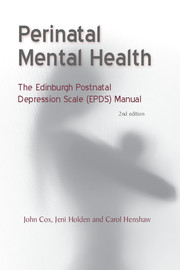Book contents
- Forntmatter
- Contents
- The authors
- Acknowledgments
- Abbreviations
- List of Figures
- Foreword
- Preface to the First Edition
- Preface to the Second Edition
- 1 Postnatal Depression: An Overview
- 2 The Origins and Development of the Edinburgh Postnatal: Depression Scale
- 3 International and Cross-Cultural Issues
- 4 Using the Edinburgh Postnatal Depression Scale in Clinical: Settings: Research Evidence
- 5 Humanistic and Person-Centred Interventions in Perinatal Depression
- 6 Screening and Intervention Services in the Community
- 7 Using the Edinburgh Postnatal Depression Scale
- Appendix 1 The Edinburgh Postnatal Depression Scale
- Appendix 2 Translations of the Edinburgh Postnatal Depression Scale
- References
- Index
5 - Humanistic and Person-Centred Interventions in Perinatal Depression
Published online by Cambridge University Press: 05 February 2021
- Forntmatter
- Contents
- The authors
- Acknowledgments
- Abbreviations
- List of Figures
- Foreword
- Preface to the First Edition
- Preface to the Second Edition
- 1 Postnatal Depression: An Overview
- 2 The Origins and Development of the Edinburgh Postnatal: Depression Scale
- 3 International and Cross-Cultural Issues
- 4 Using the Edinburgh Postnatal Depression Scale in Clinical: Settings: Research Evidence
- 5 Humanistic and Person-Centred Interventions in Perinatal Depression
- 6 Screening and Intervention Services in the Community
- 7 Using the Edinburgh Postnatal Depression Scale
- Appendix 1 The Edinburgh Postnatal Depression Scale
- Appendix 2 Translations of the Edinburgh Postnatal Depression Scale
- References
- Index
Summary
Maternal depression not only affects the quality of a woman's own life and experience of mothering, but can cast a long shadow on her whole family. Her reduced sensitivity may have adverse effects on her infant's emotional and cognitive development, and her other children may also be affected. For partnered women, increased irritability and loss of affectionate responsiveness may affect the couple's relationship or even lead to the break up of the family. Fathers may also have depression. Developing and practising preventive and therapeutic measures is both cost-effective and humane, and the importance of targeting scarce resources is increasingly acknowledged. In this chapter we examine innovative research in many parts of the world with implications for clinical practice.
The Edinburgh counselling intervention
The Edinburgh counselling intervention (Holden et al, 1989) gave health visitors a key role in finding practical ways of helping women with depression in a randomised controlled trial. Health visitors, who are qualified health professionals and part of the primary care team, provide a preventive health service. At the time of our research, most health visitors visited all women 10 days after childbirth, followed by regular assessments at home or clinic. They were thus in a key position to pick up problems and provide a link between a woman and her doctor and other services.
Seventeen health visitors in Edinburgh and Livingston (Scotland) were given brief training based on Rogerian non-directive (person-centred) counselling, using videos, case discussion, role-playing and written information about counselling, postnatal depression and how to administer the EPDS. They were asked to pay eight extra weekly ‘listening’ visits to women in their case-load who had been identified as having depression. Women who had scored 12 or above on the EPDS 6 weeks after giving birth were assessed for depression during a home visit about 3 months after the birth by a research psychiatrist using the CIS (Goldberg et al, 1970), with the diagnosis of depression derived from the RDC (Spitzer et al, 1978). Women with depression were randomly allocated to the treatment group or to a control group that received routine primary care.
Health visitors were only informed of women in the treatment group, who received the weekly visits in their own home, when they were encouraged to talk about their feelings; questions about baby care were to be discussed separately.
- Type
- Chapter
- Information
- Perinatal Mental HealthThe EPDS Manual, pp. 42 - 59Publisher: Royal College of PsychiatristsPrint publication year: 2014

